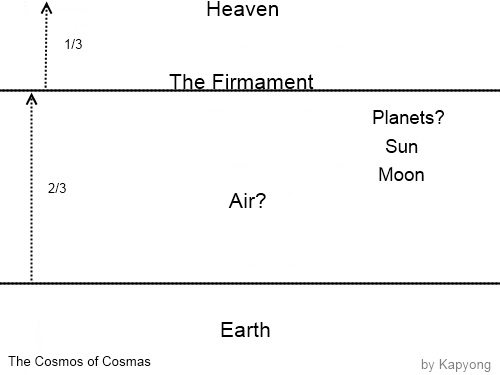
 |
Freethought & Rationalism ArchiveThe archives are read only. |
|
|||||||
|
|
Thread Tools | Search this Thread |
|
|
#11 | |||
|
Veteran Member
Join Date: Mar 2002
Location: Perth
Posts: 1,779
|
Gday,
Quote:
But it sounds heavenly because : * Mt Zion is mentioned (usually meaning the heavenly one in this period I think.) * he asks an angel * they have put off mortal clothing Quote:
We see various references to Satan in the firmament or the Air - causing disobedience etc. Quote:
Still making progress with understanding each other :-) K. |
|||
|
|
|
|
#12 | |||||||||
|
Veteran Member
Join Date: Apr 2003
Location: Australia
Posts: 5,714
|
Quote:
I suspect you see it as "any place in the heavens where the gods act". Since these are (to our eyes) myths, they are therefore part of a 'mythical world'. But that isn't Doherty's "World of Myth". A myth is a story that comes to a dramatic conclusion, the conclusion having significance to the believer. Think of the examples given by Doherty: Attis is castrated (which has significance in the mysteries); Mithras sheds the eternal blood of the bull (bringing renewed life to earth); Christ is crucified (leading to salvation). These are all conceptually the same: stories that are assumed to be true in some way. The question is, where were these myths thought to have been carried out? According to Doherty, the myths were thought to have been carried out in an upper world, which is his "World of Myth". As far as I can see, these myths were thought to have occurred on earth (and let me repeat for the umpteenth time for the benefit of those who keep getting me wrong on this: that Paul saw Jesus as being crucified on earth doesn't automatically mean 'Jesus was real!') For an example of something that is NOT a myth (in the sense above): The Last Judgement, where everyone is standing before the throne of God, waiting to be judged. True, it takes place in Heaven, but where else is God going to do things? But it doesn't therefore form part of a 'mythical world', in the sense of a 'World of Myth'. So keep in mind that, when talking about "myth", it isn't "myth" as we see it today. Think of it as tales that they told about their gods -- eating, sleeping, drinking, fighting -- which occurred somewhere where the gods could eat, sleep, drink and fight. Quote:
Quote:
Quote:
Quote:
 but I'll admit to my layman status and happily say I may be wrong on both. Doing this is very useful for me as well. but I'll admit to my layman status and happily say I may be wrong on both. Doing this is very useful for me as well.By the way, my review of Doherty's book is now up, so no worries referring to that if you like. Also, I removed the section on 'Platonic Counterparts', not because it was wrong -- I still see trying to fit a "World of Myth" into the lower heavens as a Platonic counterpart being a huge stumbling block for Doherty's theory -- but because it deserves a lot more focus than I gave it. I may revisit it in the future, though I plan to turn to other things, so probably won't. |
|||||||||
|
|
|
|
#13 | |
|
Veteran Member
Join Date: Jan 2007
Location: Mondcivitan Republic
Posts: 2,550
|
Quote:
The Ezra books (which go far beyond the Ezra that preceeds Nehemiah in English bibles) go by a tremendous number of names. DCH |
|
|
|
|
|
#14 | |
|
Contributor
Join Date: Mar 2006
Location: Falls Creek, Oz.
Posts: 11,192
|
I see the following source as supporting Doherty's World of Myth.
Quote:
This source discloses the battle between the Christians and the Powers of Apollo at the time in the late 3rd and early 4th centuries, which precipitated the alleged great persecution, happened in a strange and MYTHICAL realm.  Whereabouts would this battle have taken place Kapyong? Precisely where did the 3rd/4th century Christian (Jedi master) practitioners silence Apollo's oracles? I dont think this realm was either real or historical, but rather ---- in the words of Arnaldo Momigliano, "reflect the inevitable vagaries of Eusebius’ mind to whom chronology was something between an exact science and an instrument of propaganda.". I dont know if Earl has read Momigliano, but its appears that Eusebius was not slow in admitting that it was in a mythical realm, that a preliminary and very real battle was won by Christians against the powers of Apollo. |
|
|
|
|
|
#15 | |
|
Veteran Member
Join Date: Mar 2002
Location: Perth
Posts: 1,779
|
Gday,
Quote:
I've got it sorted I think - my collection now includes : Ezra 4 Ezra 5 Ezra 6 Ezra Greek Apocalypse of Ezra Revelation of Ezra Questions of Ezra Vision of the Blessed Ezra K. |
|
|
|
|
|
#16 | |
|
Contributor
Join Date: Mar 2006
Location: Falls Creek, Oz.
Posts: 11,192
|
Evidence of the "World of Myth" at NHC?
I am taking the liberty of responding to Toto's information in another thread The NHC material seems to substantiate Earl Doherty's claims in some manner, and especially interesting is the discussion by the author of the following book at Page 218 (Google Books), located by Toto. Thanks very much again Toto for your invaluable resourcefullness. Best wishes, Pete Quote:
|
|
|
|
| Thread Tools | Search this Thread |
|